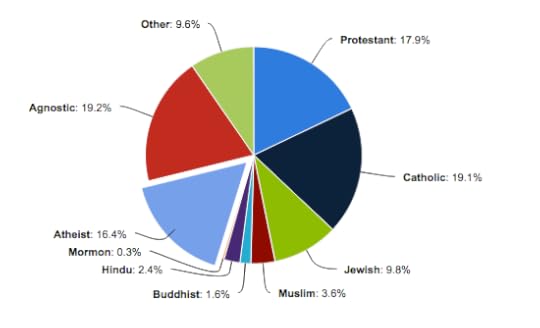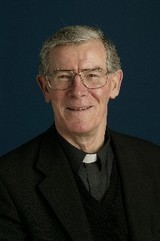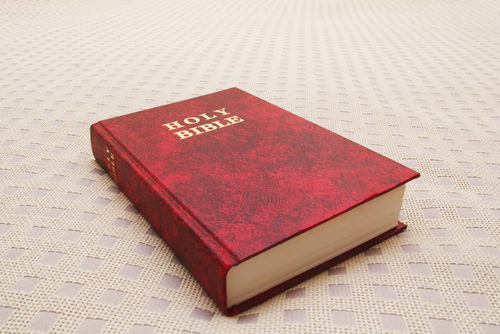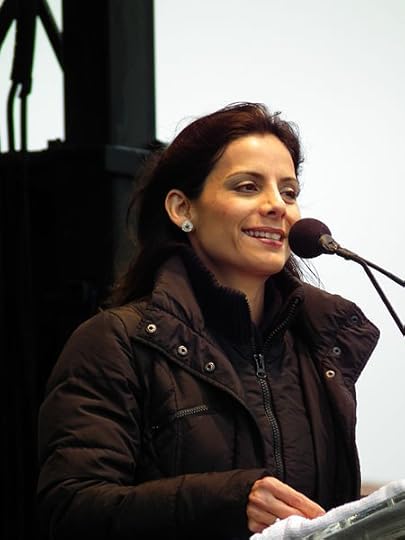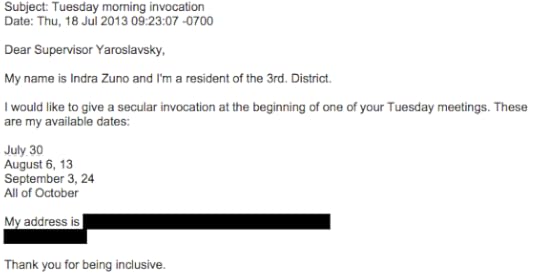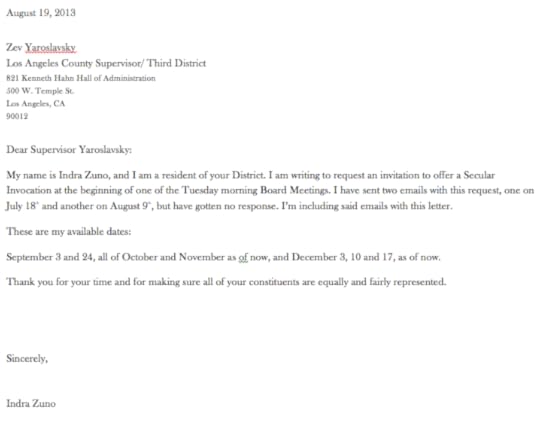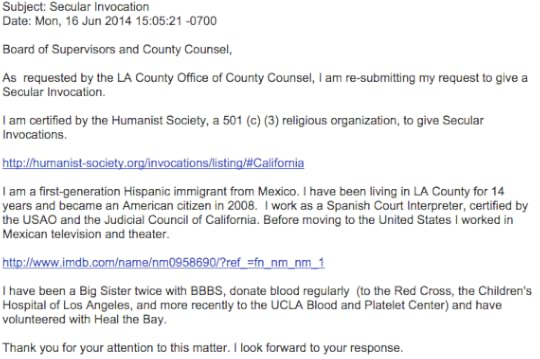Hemant Mehta's Blog, page 1934
September 6, 2014
Can Catholic School Students in Ontario Skip Religious Classes? Yes, but This Teacher Was Punished for Saying So
It’s back-to-school time, and this year Catholic school teacher Paul Blake goes back to the classroom in England rather than in Canada, where he and his family moved after an Ontario school board marred his record as an educator with a disciplinary note. They say his behavior was “inappropriate,” that he “undermined the vision and mission of the board.”
His infraction? Last year, he informed a group of Grade 12 students of their right to be exempted from any explicitly religious content within their education.
He told them about a recent court case, in which the Erazo family of Brampton (considered part of the Greater Toronto Area) successfully won the right to keep their son enrolled at a Catholic secondary school despite his non-participation in the school’s religion classes and religious retreats, liturgies, or ceremonies. The ruling opened the door for non-Catholic students to demand access to good-quality Catholic schools without the religious baggage.
(Full disclosure: I grew up in Brampton, Ontario. During my ultra-religious teenage years I was heavily involved in the local Catholic parish affiliated with this school. I didn’t go to the secondary school at the heart of this case, but I have close friends and family who did.)
As for the actual legislation at issue, Ontario’s Education Act states that…
… no person who is qualified to be a resident pupil in respect of a secondary school operated by a public board who attends a secondary school operated by a Roman Catholic board shall be required to take part in any program or course of study in religious education on written application to the Board.
Legally, then, what Paul Blake told his students is correct: students are allowed to seek exemptions from religious courses and in-school religious ceremonies.
Most Catholic school boards, however, prefer to keep as many students as possible from exercising that right. Thus, Blake’s principal told him (prior to the incident for which he was disciplined) to avoid discussing the court case with his students. When Blake was laid off, however, he decided to tell them the truth about the religious exemptions, which he felt the school board was trying to conceal from the students.
A Globe and Mail investigation backs up Blake’s observations. The newspaper found that school board officials have denied parents’ requests for exemptions, telling parents who have declared themselves as Catholic-school supporters for tax purposes that their children are not eligible for the exemption (though some parents say they’ve seen the denials persist even after they changed their tax status). The creators of myexemption.com list potential challenges students face when seeking exemptions; they include threats to withhold extracurricular activities, honor-roll status, and even graduation.
Whether you agree or disagree with Blake’s official reprimand, it’s hard to support the misinformation students are getting when they seek exemption from religious courses — an exemption that they have every right to request under current Ontario law.
Most students and families, who are told to “go to the public school” if they want to opt out of religious programming, are choosing their local Catholic school for valid, logical reasons that have nothing to do with the family’s religion. They may perceive that the Catholic school in their area provides a better fit than the nearby public option, in spite of any religious differences. Some families cite a longer commute to the nearest public school. Nor are all the families opting out of religious programming non-Catholics. Many sincere Catholics opt out because they want their children to focus on the math, science, and language courses that will best help them achieve their career goals.
Carolyn Borgstadt‘s family falls into that category: she is Catholic, but her son has never been baptized, and she sought an exemption so he could put the extra time into improving the math skills he’d need for a construction apprenticeship. On CBC Radio, Borgstadt put it this way:
It’s just a waste of time… religion just isn’t, in everyday life, it’s just not needed.
A 2012 study suggested it’s also a waste of money; the Federation of Urban Neighbourhoods of Ontario expected that a merger of the two school systems would save nearly $1 billion by cutting duplication of services and increasing economies of scale.
In an op-ed following the Erazo case, the Toronto Star’s Thomas Walkom asked rhetorically, “What’s the point of a religious school system if students can opt out of religion?”
It’s a fair question.
(Image via Shutterstock)
Non-Religious Students Make Up More Than a Third of Harvard’s New Freshman Class
It’s not a scientific survey by any means, but Harvard’s newspaper, The Crimson, asked incoming freshman to fill out a survey in order to assess various demographic trends. More than 70% of students responded. The section about religious beliefs, in particular, is unbelievable:
The percentage of atheists/Agnostics (35.6%) is almost identical to that of Protestants/Catholics (37%). If you included “Other” in our category, as many surveys often do, it’d be even higher.
I’m not claiming that’s representative of anything beyond just Harvard — which isn’t exactly a run-of-the-mill school — but I wonder how many other colleges are seeing similar trends.
When we say that about a third of young Americans are non-religious, that percentage includes people who are “spiritual but not religious” and people who believe in God but hate religious labels. If we could isolate just the students who are explicitly non-religious, I suspect that number would be much smaller but still on the rise with every passing year.
I wish other schools would collect that information to the best of their abilities and release the data. I’m sure it would be fascinating, even if it’s not a perfect sample.
Incidentally, The Crimson ran a similar survey of last year’s graduating class and found that 38% of respondents were atheist/Agnostic. It’ll be interesting to see if this year’s freshman class becomes even less religious by the time they graduate.
Irish Bishop Says Catholics Can’t Support LGBT Center “On Moral Grounds” Because It Will Harm City’s Poor
In Galway, Ireland, a vaguely Christian volunteer group called the St Vincent de Paul (SVP) Society has given a grant to a local LGBT group. It’s meant to help them create an LGBT community resource center, a much-needed space in a traditionally Catholic area.
Local Catholic bishop Martin Drennan (below), however, has jumped in at the last minute to protest because he says building the center will hurt the poor and “send the wrong message” about Christian charities.
As a self-described social justice organization dedicated to fighting poverty, SVP’s primary function is to send volunteers to households that need assistance. The group gave €45,000 (more than $58,000) over three years to Amach LGBT Galway, a locally-supported community organization, to help build the LGBT center (and their contribution will only partially cover the costs). The grant was approved through a fund dedicated to the late Maureen O’Connell, a supporter who willed part of her legacy to SVP, and therefore not taken out of the group’s overall funding.
According to Jim Walsh, an SVP spokesperson, the donation “is a fraction of what the SVP spends in providing direct assistance to families and individuals.” He added that the donation was in line with SVP’s Christian ethos, which says is “to be non-judgmental when its assistance is sought.”
The decision to help Amach “was made purely on the basis of need in the Galway area, in the same way as all requests for support are assessed. It does not signify any other motive,” he said.
He also confirmed that the SVP had no formal association with the Catholic Church or its bishops but that “relationships at a local level were very strong with local clergy, very much involved.”
But even though there is no formal connection between them, Drennan, the Catholic Bishop of Galway, says the donation tarnishes SVP’s reputation and showed “poor moral judgement.”
Bishop Drennan said that “on moral grounds we can’t support that.” Homosexual activity was “in our eyes morally wrong behaviour and we cannot put funds at the service of what we don’t believe is morally incorrect.”
He appeared on a radio talk show this week to say he worried that “the poor of the city” would ultimately be harmed by the new LGBT center. LGBT people in Ireland are, in fact, more likely to live in poverty and less likely to have healthcare access than their non-LGBT peers, and also struggle to find health providers, counselors and homeless shelters that affirm and accept them. This is a trend in most, if not all, of the world, and it’s due mostly to the discrimination they face from all kinds of people. Extremely religious folks definitely included.
That doesn’t really matter to Drennan, though.
If it “supports an organisation we don’t agree with, we can’t support it anymore, that’s what I’m hearing,” he said.
When it came to such grants “you have to judge what’s going to be the outcome,” he said, “you have to judge the worthiness of the cause.”
So, to recap: Major, quasi-religious group identifies a need in the community. Group gives relatively small amount of money to local group to make it happen. Catholic bishop, who ultimately has no say in the matter, says you have to “judge the worthiness of the cause” before making this act of generosity, and defames Group.
Guess caring for the sick and poor only applies to straight people?
If the Duck Dynasty Guy Can’t Convince Atheists To Watch the Left Behind Movie, Nothing Will…
The Left Behind movie starring Nicolas Cage just got an endorsement from Duck Dynasty‘s Willie Robertson. If you’re a conservative Christian, I’ll give you a moment to adjust your pants. If you’re like me, you’re still wondering who the hell Willie Robertson is.
Well, he’s the guy who thinks you’re going to convert to Christianity after you watch a movie about the Rapture:
… I believe people are going to make that life-changing decision to follow Christ on the way home from the theater on Oct. 3. Let’s all make sure we bring some friends and family to see this movie — people who need to see to believe.
Opening the door to unbelievers has never been this much fun.
Anyone who thinks atheists are going to flip the switch in our minds to “Off” after we watch a movie that tries to scare us into believing everything the Bible says is delusional. Trust me: If God’s Not Dead didn’t sway us, Nicolas Cage sure as hell isn’t going to make us find Christ.
But if the Rapture gets the Duck Dynasty guys off the air because they’re off to meet God, I’ll give it some serious consideration. According to Robertson, it’s going to happen “any day from now.”
Sure it is, Willie. Sure it is.
(via Christian Nightmares)
A Debate on the Existence of God Between Dan Barker and Matt Slick
At this year’s Freethought Festival at the University of Wisconsin-Madison, Freedom From Religion Foundation co-President Dan Barker debated Christian apologist Matt Slick on the topic of God’s existence:
I haven’t had a chance to watch the debate yet, but if any parts stand out to you, please leave the timestamp/summary in the comments!
(via Atheists, Humanists, & Agnostics)
September 5, 2014
Friendly Atheist Podcast Episode 14: Daniel Dennett, Author and Philosopher
Our latest podcast guest is author and philosopher Daniel Dennett:
Jessica spoke with him about the term “atheist” and its alternatives, his project “Caught in the Pulpit” about preachers who no longer believe what they preach, and the culture of Americans who prefer to stay put instead of travel abroad.
We’d love to hear your thoughts on the podcast. If you have any suggestions for people we should chat with, please leave them in the comments, too.
You can subscribe to the podcast on iTunes, get the MP3 directly, check it out on Stitcher, or just listen to the whole thing below.
And if you like what you’re hearing, please consider supporting this site on Patreon and leaving us a positive rating!
If You Want Politicians to Fill Out Your Questionnaire, Can You At Least Ask Properly-Worded Questions?
Like many news organizations, 40/29 News in Arkansas has a questionnaire they sent to all major political candidates. They’re publishing the responses on their website and one question in particular stands out for its *awful* wording:
Do you think prayer should be allowed in schools?
Every single atheist I know would say yes to that question. If students or teachers want to pray privately, I have no desire to stop them. What I (and many others) oppose are school-sponsored prayers, whether they’re led by teachers, principals, or football coaches. That’s the question they should be asking, but you’d never know that from the word.
Despite that, Nate Steel, a Democrat running for Attorney General, managed to screw up the softball question:
I think the freedom of religion does not mean freedom from religion. Growing up in a rural public school, blessings and prayers were commonplace.
I have no idea what that means. Does the Attorney General wannabe want to ignore the First Amendment and let school officials lead prayers? Does he want Christianity to be imposed upon the students? Who knows. A better-worded question might have elucidated the matter.
Incidentally, Steel’s other answers are no better. It’s hard to distinguish him from your typical southern Republican. In fact, he may have fooled the news team, too — check out the URL on that site.
(Image via Shutterstock. Thanks to Brian for the link)
Penn State Issues a Clarification for Ignorant People About Bibles in Campus Hotels
I posted yesterday about how, at the urging of the Freedom From Religion Foundation, Penn State officials had removed Bibles from campus-owned hotel rooms.
I wrote about that because that’s what FFRF was told:
FFRF received word Sept. 3 from the general counsel at Pennsylvania State University that bibles have been removed from the Nittany Lion Inn and the Penn Stater Conference Center Hotel in State College. Both are run by the university.
…
[FFRF Co-President Annie Laurie] Gaylor added, “So we’re grateful to Penn State for making this decision to respect all its hotel guests and stay above the religious fray.”
Here’s what I imagine happened after that:
Christians everywhere began complaining about how the university bowed down to atheists and removed bibles from the hotels (not the rooms) because the people who complain about things like this never bother to get a full understanding of the situation — or the First Amendment, for that matter. (We saw that ignorance on full display last week after a high school football game, too.)
It led to Lisa M. Powers, the director of Penn State’s office of strategic communications, telling the Christian Post that people need to back the fuck off (I’m paraphrasing) because the Bible is still available to anybody who wants it. Just not in the rooms. Just like it should be:
“The Bibles have not been removed from our hotels. The decision to make Bibles and other publications available in our libraries and other public access areas was made in mid-summer,” said Powers. “There are still Gideon Bibles at our facilities and they have been there for decades. We do not have a specific date for when they originated.”
While the Bibles are not in “individual guest rooms,” they remain “available in our public access areas” for “those who wish to use them,” explained Powers.
The headline for the article — “Penn State Denies Removing Bibles From Hotels Following Atheist Complaint” — makes it sound like FFRF lied about what they said and Penn State had to set the group straight. That’s not the case at all.
Penn State did the right thing and FFRF explained it correctly in their news release. The problem, I’m assuming, is that many Christians don’t have any clue what’s going on and they just feel the need to complain about something because they think their rights are under attack. Somehow.
(Image via Shutterstock. Thanks to Brian for the link)
Thanks to Atheist’s Sit-Down Protest, Winter Garden City Commissioners (FL) Vote to Eliminate Invocations Altogether
You may recall that Mayor John Rees, the leader of the Winter Garden City Commissioners (in Florida), kicked atheist Joseph Richardson out of last week’s meeting after he refused to stand for the invocation and Pledge of Allegiance:
Rees singles out Richardson for not standing up
Several atheist members of the Central Florida Freethought Community said they would stage a silent protest next week by attending the city’s next meeting and remaining seated during the invocation and Pledge in solidarity with Richardson.
That won’t be necessary anymore.
The commissioners gathered today for a special meeting to decide how to handle situations like this. They were considering three possible options: replacing the invocations with a moment of silence, opening up the invocations to everybody (including — *gasp* — atheists), or eliminating the invocation and Pledge altogether.
Any of those would have been acceptable, and I’m happy to say it looks like atheists shouldn’t have a problem anymore:
On Friday, they voted 3-2 to replace prayer with a moment of silence and allow people to stay seated during the Pledge of Allegiance.
Smart move. It prevents a lawsuit and protects the inclusive nature of government meetings. And it wouldn’t have happened unless Richardson had knowledge of his rights and the courage to remain seated last week.
(Thanks to Brian for the link. Portions of this article were posted earlier)
One Atheist’s Year-Long Attempt to Deliver a Secular Invocation in Los Angeles
It shouldn’t be hard for atheists to deliver secular invocations.
Yet, in places like Greece, New York, town officials have worked to deny atheists that opportunity — even after the Supreme Court decision.
Indra Zuno (below), an activist from Los Angeles (who spoke at the 2012 Reason Rally), didn’t think it would be very difficult at all.
For more than a year now, she’s been trying to deliver an invocation at the weekly meeting of the Los Angeles Board of Supervisors. And for most of that time, they’ve ignored her.
It began last July with an email to her representative Zev Yaroslavsky:
She got no response. So she sent a follow-up email a few weeks later:
That didn’t work. So she sent something via snail mail:
No response. So she hand-delivered that same letter to the board office. Zuno was eventually told someone would respond to her by January after a review… but that never happened. So she sent another letter to Yaroslavsky’s personal office in February. (Are you seeing a pattern yet?)
That must have done it! Because the board finally responded to her… to tell her she was rejected.
The invocation is an opportunity to invoke divine or spiritual guidance, give blessings, or offer an affirmation, and introduce a solemn tone in anticipation of the Board meeting. Invocations must be non-sectarian, and may not be used to advance a particular belief or disparage any other belief. Further, it is not a time to express political views, attack County policies or practices, or mock County policies or practices.
… Your request did not include information about yourself, or your affiliation with any recognized religious, spiritual, or community group. Please provide this information so that you may be fully considered as a potential invitee.
Keep in mind Zuno never said she wanted to disparage anyone’s views or promote her atheism.
Finally, the American Humanist Association’s Appignani Humanist Legal Center got involved. Attorney Monica Miller sent a letter to the board:
Over the following months Ms. Zuno patiently waited and occasionally inquired regarding the status of her request, but was consistently met with unresponsiveness and delay. Despite her sincere interest, cooperation, and persistence, no attempt was made to work constructively with her, and she was finally denied in a bureaucratic and dismissive manner. Unfortunately, this series of events can only be construed as reflecting an unfair and unlawful bias against Ms. Zuno’s secular views.
The LA County Office of County Counsel eventually responded to that in May. They said they weren’t formally rejecting her, and Zuno just needed to resubmit information about herself and her affiliation with a Humanist group. So that’s precisely what she did:
She sent them a hard copy of the same email a month later.
As of a few days ago, she still hadn’t heard back.
It’s incredible how many hoops Zuno had to jump through despite very clear requests to deliver the invocation. Even if the board argued that she wasn’t giving them all the information they needed, there was no attempt to communicate that information to her until some legal weight was thrown into the mix.
This week, Zuno called Yaroslavsky’s office twice to follow up on her requests. Yesterday, a staffer finally called her back to give her the good news: She would get to speak at the meeting on November 12. (Zuno is still waiting to get that in writing.)
It’s about damn time.
But I promise you that no one whose first name is “Reverend” ever has to do this much work just to offer some words of wisdom at the beginning of a government meeting.
(Image via Wikipedia)
Hemant Mehta's Blog
- Hemant Mehta's profile
- 39 followers



